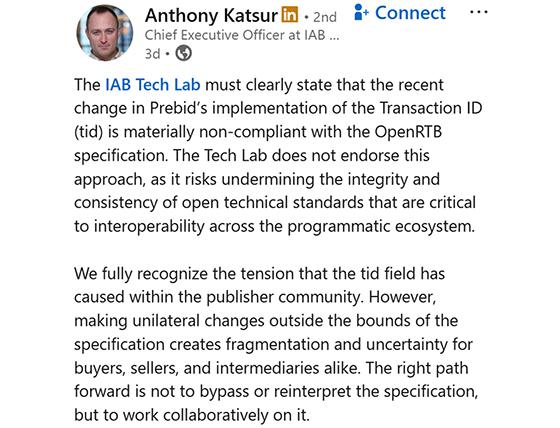
Artificial intelligence (AI) continues to change
demand-side platform (DSP) strategies by moving beyond automation to predictive, real-time optimization of the entire ad-buying process.
This change sparked a discussion during the
weekend about DSPs optimizing bid strategies through predictive algorithms.
"DSPs want to bid on each impression once,” Brian O’Kelley, co-founder and CEO at Scope3, wrote in a
post on LinkedIn during the weekend. Scope3 provides tools and platforms to measure and reduce carbon footprints for digital ad campaigns.
If publishers generate a unique ID for each
impression, he wrote, then the DSP can carry out predictive logic that will assess the likelihood that a given supply path is the shortest and best route for the publisher to take on a specific
advertising placement.
While it may seem like a logical concept for optimization, it touches on controversies around data transparency and potential privacy implications, particularly for
publishers and their supply-chain partners (SSPs).
advertisement
advertisement
The prediction centered on the DSP's desire to optimize bid strategies through predictive algorithms that assess supply-path efficiency, and
going direct to the supply because they can't trust the programmatic supply chain to give them transparent information.
O’Kelley described this prediction based on the programmatic
advertising industry struggling with pressure over transaction identifier standards in the age of generative artificial intelligence (GAI) and contextual predictions, as DSPs and SSPs dispute the
fundamental architecture of bid request transparency. Some believe it requires further attention to regulatory changes.
Kevin Lee, Didit co-founder, never understood the rationale for not
unifying supply signals. “It's as if the commodity markets not only let you bid on each pork belly separately, but had the same pork belly with a dozen IDs,” he wrote in the comments. He
is one of the first industry executives to agree with O’Kelley.
Gabriel Dewitt, head of monetization at Yahoo, does not think transaction IDs will matter much, and believes the biggest
shift will be seen in the ways that large language model agents will “supercharge” the concept of direct-to-publisher buying. This will change the relevance of indirect digital ad spend,
Dewitt wrote.
Will Luttrell, founder of data security software company Honeycake, questioned whether publishers are just now figuring out that the entire ecosystem has been
“systematically screwing them over and decided to lob a hand grenade. I mean, we've all seen some truly wild behavior in ad tech to game the system for vanishingly small edges. …
“Why not publishers?," Luttrell said.
The technical dispute arose from recent changes in Prebid's implementation of transaction ID standards. Anthony Katsur, CEO at IAB Tech Lab, last
week on LinkedIn issued a statement that the recent change in Prebid's implementation of the Transaction ID (TID) is materially noncompliant with the OpenRTB
specification.
Prebid is a collaborative and open-source framework that is used programmatic advertising to implement header bidding.
The TID functioned as unique identifiers allowing
DSPs to recognize duplicate auctions, and enabled advertisers to see that one advertising slot was offered through multiple supply paths. Experts said the goal was to help prevent wasteful spending on
identical inventory.
“The Tech Lab does not endorse this approach, as it risks undermining the integrity and consistency of open technical standards that are critical to interoperability
across the programmatic ecosystem,” he wrote, despite the organization recognizing the tension the TID field has brought to the publishing community.
“Making unilateral changes
outside the bounds of the specification creates fragmentation and uncertainty for buyers, sellers, and intermediaries alike,” he wrote. “The right path forward is not to bypass or
reinterpret the specification, but to work collaboratively on it.”